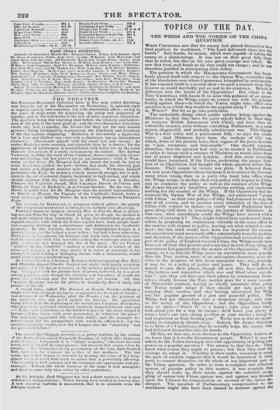THE THEATRES.
SIR EnwAnn BELWER'S historical farce in five acts, called Richelieu, was brou;sht out at the Ha)market on Wednesday, in splendid style as regards scenery and costumes, but with diminished effect ; owing to the want of stage-room for displaying ate pomp and pageantry of royalty, and to the inferiority in the cast of some important characters. The spectacle being less imposing than before, the trickery and hollow- ness of the play is the more glaring; and the two characters who alone excite any real sympathy, the lovers—for they are the only sincere persons—being inadequately represented, the falsehood and treachery of the rest become disgusting. Richelieu is not merely a hypocrite, but a base and shallow one—not only a charlatan, but an inconsistent character. MACREADY played with his usual tact and energy : he makes Ric:Whit more cunning and plausible than he is drawn ; for the appearance of earnestness is counterfeited with better art by the actor than are the actions of a crafty statesman by the author. Mrs. EDWIN YARNOLD. as Julie, the ward of the Cardinal, shows considerable clever- ness and feeling, but her powers are as yet immature ; while J. WEB- STER, as her lover, De Mauprut, had not learnt the words he had to utter, much less studied the part—defects that made his slovenly gait and action and flippant manner quite offensive. WEBSTER himself personates the Kitty: he makes a comely monarch enough, but is defi- cient in the air of personal dignity incidental to high station, and which should contrast with his imbecility in affairs. WAEDE is Baradus, PHELPS the Capuchin Joseph, Miss CHARLES Marion de tame, and HOWE the Page of Richelieu, as at Covent Garden. By the way, Mr. HOWE is much fitter for De Mauprat than the present representative. O. SMITH as Huyuet, the Captain of the Cardinal's Guard, looks a most picturesque military bravo; he is a worthy pendant to PHELPS'S Friar.
The scenery, by MARSHALI„ is gorgeous without glitter: the poetry of the sumptuous uecorations is brought out skilfully and effectively. PowEa's lesson to lodgers, showing Bow to Pay the Rent, is divert- ing enough from the way in which he gives it, though the method is not more original than reputable ; it being the established practice of roguish tenants, with which the Police reports have made people fanti- liar—namely, kicking up a disturbance and destroying the landlord's property. In this instance, however, the lodginghouse-keeper is a miserly ch...at, and the lodger a poor widow ; but had it been otherwise, Powt,e's 1:::,y impudence, sly humour, and ready tact, would have car- ried the Ladle:ice with him. notwithstanding the wearisome details and silly se::timent that damped the fun of the piece. To see POWER " putting up his wardrobe "—nailing a cord across a corner of the room al.fl ii:algitig a few rags across it to serve as a curtain to his stump 1,orl —and leading a thumping chorus with a broomstick, would make even a duped landlord laugh.
At Covent Garden, CHARLES KEMBLE, besides repeating Don Felix and Merestio, played Charles .S''tujfare lust night, with manly. propriety and grace ; but the' fire an dvivaeity of the reckless prodigal were want- ing, compsred with the present race of actors, however, he is a giant among pittiies ; and though the elasticity and buoyancy of youth are gone, the c.:rilleinan and the finished actor yet remain. All that CHARLLS KEMELE was iu his prime, he became by dint of study and practice in his art.
A stupid farce, called The Baronet, or Female Society—without a single new idea or smart saying to compensate fin- its want of bustle— was attempted on Wednesday, after the Wonder ; hut the patience of the audience Was not prfwf against its dulness : the opposition being renewed at the beginning of the second act, CHARLES 31ATnEw5, who played the principal character, suddenly stepped him:ad and said —" Ladies and gentlemen, as the further it goes on the more absurd it become, I beg leave, with your permission, to withdraw the piece." The audience applauded this welcome relief; and the manager de- serves credit for the promptitude with w Rich he afforded it : but the question naturally occurs, how did it happen that the "absurdity " was not pereei‘ed before


























 Previous page
Previous page